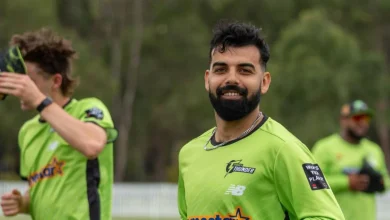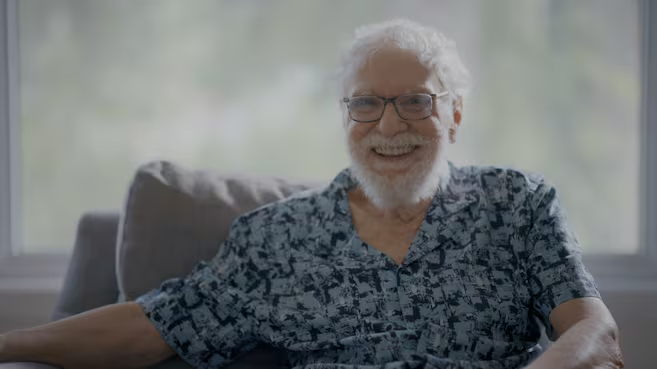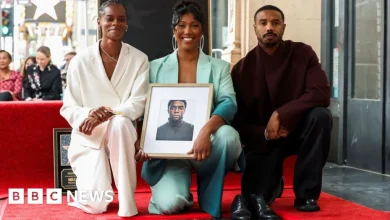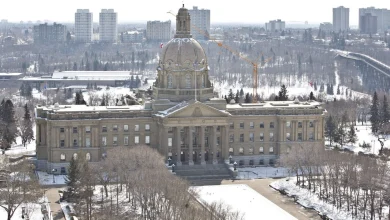Carney, Modi agree to launch negotiations on new Canada-India trade deal: source
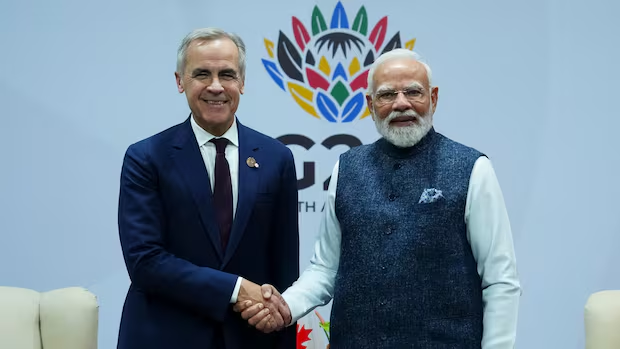
Prime Minister Mark Carney and Indian Prime Minister Narendra Modi have agreed to launch negotiations toward a new trade deal called a Comprehensive Economic Partnership Agreement, according to a senior government official.
A news release from India’s Ministry of External Affairs sent out Sunday afternoon confirmed the development. It said the agreement would be aimed at doubling bilateral trade to $50 billion US ($70.5 billion Cdn) by 2030 — and that Modi invited Carney to visit India.
It’s the latest sign that diplomatic relations between Canada and India are thawing after a deep freeze over Canadian allegations that Indian agents were linked to an extrajudicial killing of Sikh activist Hardeep Singh Nijjar on Canadian soil in 2023.
The news comes shortly after Carney and Modi met at the G20 summit in Johannesburg, South Africa.
It’s the second time the two leaders have met face to face since Carney came into office — they last met at the G7 summit in Canada in June.
Dinesh Patnaik, India’s high commissioner to Canada, said in a Sunday morning interview on Rosemary Barton Live that the two countries have been discussing trade since the G7 summit.
Dinesh Patnaik, India’s high commissioner to Canada, is shown at the High Commission of India in Ottawa on Oct. 16. (Spencer Colby/The Canadian Press)
Patnaik said there was “much appreciation of how we have moved forward on a lot of issues,” and he specifically cited how International Trade Minister Maninder Sidhu met with India’s minister of petroleum and gas — a key sector for the country.
“So it’s all leading up to this meeting [between Carney and Modi], and this meeting had both of us discussing trade,” Patnaik said.
Canada and India launched talks 15 years ago for such a trade deal, but it was downgraded to a sectoral deal that would touch only specific industries, up until the fall of 2023. Ottawa suspended trade talks after it went public with the allegations over Nijjar’s killing.
On Sunday morning, Modi said in a social media post he had a “very productive” meeting with Carney and that India “appreciated the significant momentum in our bilateral ties since our earlier meeting held during the G7 Summit hosted by Canada.”
CSIS remains ‘very vigilant’ against alleged threat
The Carney government continues to face questions about why it’s trying to improve relations with India after the RCMP last year publicly accused agents of India’s government of involvement in homicides, extortion and threats on Canadian soil. India has denied the accusations.
Just last week, Canadian Security Intelligence Service director Dan Rogers suggested the problem hasn’t gone away and that the agency still has to be “very vigilant” against the alleged threat from India.
Patnaik told host Rosemary Barton that Canada should not set aside security concerns to pursue stronger ties with India “like we don’t set our concerns aside.”
WATCH | Who was Hardeep Singh Nijjar, the man India is accused of killing?:
Who was Hardeep Singh Nijjar, the man India is accused of killing?
Hardeep Singh Nijjar was a pro-Khalistan activist and the president of a Sikh temple in Surrey, B.C. His day job was working as a plumber. For years, the Indian government called him a terrorist — a claim Nijjar repeatedly denied. So, who was Nijjar, and why did India think he was such a danger?
“The whole thing is both countries are mature enough to understand that we need to have a relationship where we discuss how people can be safe on the streets,” he said. “Canadians safe on Canadian streets, Indians safe on Indian streets.”
Patnaik also said if evidence is presented in court that substantiates Canada’s allegations, “then we will take actions ourselves, like we are taking action in the U.S,.” adding that India does not have evidence at this time.
“We do not want people to sully India’s image but doing activities abroad which are antithetical to exactly what India portrays,” Patnaik said.
Before his meeting with Modi, Carney told reporters on Sunday that Canada views India as a reliable trading partner and that an agreement would help scale up trade with “one of the world’s largest and fastest-growing economies.”
The prime minister emphasized that Canada has to remain vigilant on any forms of foreign interference, and he said Canada has established co-operation with Indian law enforcement and national security advisers.
“There’s engagement with a variety of nations on protecting Canadians, and we will continue to do that,” Carney said.
WATCH | Canada’s Sikh community says it faces threats from Indian gang:
As Carney and Modi make nice, Sikh Canadians say they still face threats
As Prime Minister Mark Carney and Indian Prime Minister pledge to reset relations between the two countries, members of Canada’s Sikh community say they’re facing extortion threats from an Indian gang with alleged ties to Modi’s government.
Sanjay Ruparelia, a politics and public administration professor at Toronto Metropolitan University, told CBC News it’s “quite striking” how much relations have changed between Canada and India.
Ruparelia said he thinks the trade war launched by U.S. President Donald Trump on both countries is the “single biggest event that has changed the calculus both for governments and public opinion in many countries.”
Sikhs holding independence referendum in Ottawa
Sikhs for Justice, whose Canadian chapter was headed by Hardeep Singh Nijjar until his assassination in 2023, is holding a referendum in Ottawa on Sunday as part of its campaign for an independent Sikh Punjab, called “Khalistan” by Sikh nationalists.
The new leader of the Canadian chapter, Inderjeet Singh Gosal, criticized the Carney government’s decision to try to restore normal diplomatic ties with India as premature.
Inderjeet Singh Gosal, speaking with CBC News on Parliament Hill, is the Sikh leader who has replaced Hardeep Singh Nijjar as head of the Khalistani referendum movement in Canada. (Marc Robichaud/CBC)
“You can see the extortions haven’t stopped, the shootings haven’t stopped,” Gosal told CBC News this week. “If anything, they’ve gotten worse. So when we talk about bringing back the diplomats, all we did is resume what was happening.”
The Indian government has previously described the referendum movement as a provocation and an attack on its sovereignty. Patnaik called the referendum “farcical” and said it’s a sensitive subject in India.
“This is a referendum by Canadians done in Canada. Now, if you want to do it, you do it. The problem that happens only is that back home in India, they see it as Canadian interference — foreign interference in India,” Patnaik said.
On Saturday, Foreign Affairs Minister Anita Anand was asked by CBC News at the G20 summit in South Africa what message is being sent as Carney meets with Modi on the same day as the referendum.
In response, Anand said the meeting “has been contemplated for some time and it happens to be falling on the Sunday without an intention to undermine or hurt any interest domestically.”
“And so I want to say at the forefront of every conversation is going to be the focus on the law enforcement matters, the law enforcement dialogue [and] the issues of public safety and security at home.”

